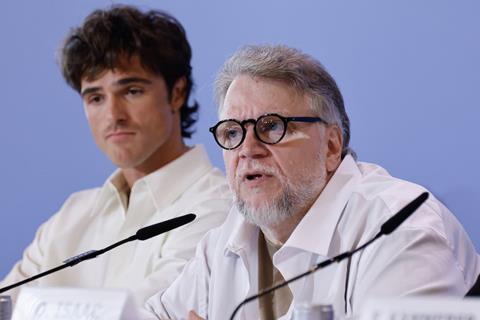
Guillermo del Toro said he “always wants more of everything” when it comes to the number of cinemas his Netflix film Frankenstein will play in; but that he is “very happy” with the streamer’s release plans.
“Look at my size, I always want more of everything,” said del Toro at the press conference for the Venice Competition film, in response to a question from Screen about the theatrical release plans. “I have to stop myself.”
“The battle we’re going to fight in telling stories is in two fronts,” said the filmmaker. “Obviously the size of the screen; but the size of the ideas is very important, the size of the ambition, of the artistic hunger that you bring to cinema. Can we reclaim scale of ideas? Can we challenge ourselves to that?
“It’s a fluid dialogue, and I’m very happy,” said del Toro of the release plans. Netflix CEO Ted Sarandos was in attendance in the front row of the press conference, ahead of the film’s world premiere on the Lido this evening.
Del Toro said his experience with Searchlight Pictures title Nightmare Alley, which “lasted very little” in cinemas in 2021 in part due to the arrival of both the Covid Omicron variant and Spider-Man: No Way Home, showed him “you never know what’s going to happen”.
“You never know which format it’s going to be,” said del Toro. “What I do know is to reach over 300m viewers, you take the opportunity and challenge to make a movie that can transform itself beautifully and that evokes that cinema, then you provide theatres for that at the beginning. That makes for me a very creative experience.”
The film will go on to Toronto and Busan film festivals after Venice. Netflix has scheduled a theatrical release for October 17 in the US, before the film lands on the streaming platform three weeks later.
Collaboration
Frankenstein is an adaptation of Mary Shelley’s 1818 classic Gothic novel, about a brilliant but egotistical scientist who brings a creature to life in a monstrous experiment.
The Mexican filmmaker reiterated that Frankenstein is a film he has wanted to make since he was a child, and that it was the collaboration with Netflix which finally allowed that.
“When I met with Ted Sarandos, we had done Troll Hunters. He said ‘what is on your bucket list?’, I said Pinocchio – he said ‘do it’. I said Frankenstein, he said ‘do it’. I said, ‘well, it’s big’, he said ‘do it’,” said del Toro.
“It was a very operatic ambition. When you direct, you can decide to be a guest or a host for your crew and cast. I wanted to make a 20-course banquet for everyone to feel it was their movie and passionately make it their own. It needed that scope.”
Del Toro denied the suggestion that the film is a metaphor for artificial intelligence. “Artificial intelligence I’m not afraid of; I’m afraid of natural stupidity, which is much more abundant,” said the filmmaker.
“We live in a time of terror and intimidation. The answer, which art is a part of, is love,” said del Toro. “And forgiveness is part of love. The central question in the novel is what makes us human? There’s no more urgent task than to remain human when everything is pushing towards a bipolar understanding of our humanity.
“And it’s not true. It’s entirely artificial. The multi-chromatic characteristic of a human being is to be able to be black, white, grey and all the shades in the middle. The movie tries to show imperfect characters and the right we have to remain imperfect, and understand each other in the most oppressive of circumstances.
“It’s biographical to me, but biographical to anyone that tries to preserve their soul in the times we’re living in.”
Del Toro was joined on stage by his cast including Jacob Elordi, who plays the monster; Oscar Isaac, who plays Victor Frankenstein; Christoph Waltz, Mia Goth and Felix Kammerer.
Elordi confirmed that he used a Yorkshire accent for his character’s early stages, inspired by the voice of David Bradley, who plays the Blind Man in the film. The actor also agreed with del Toro that the monsters of the world today are “the men in suits”.
“There is a great line in the movie that Elizabeth [Goth’s character] says ‘like most tyrants, he believes himself to be a victim’,” said del Toro of Isaac’s scientist. “If you talk to the great despots in history, they will tell you they are the underdog. It’s a tragedy that’s a lack of insight, that’s all. A lack of insight is a lack of communication.”

























No comments yet